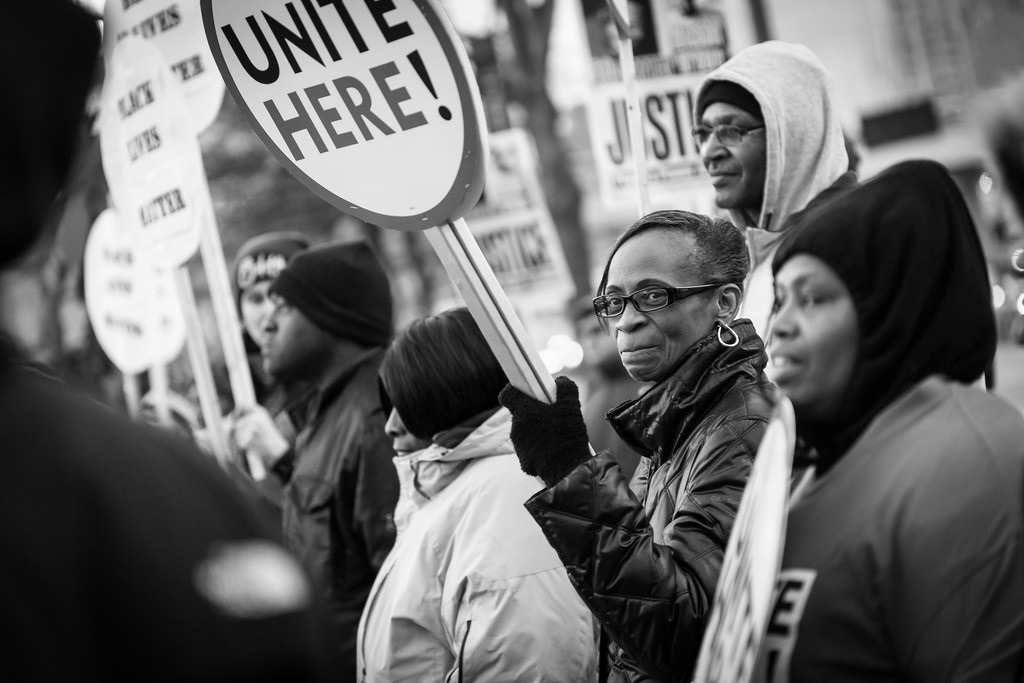
August 14, 2015; L.A. Progressive
Scot Nakagawa is a longtime community organizer who has worked for the McKenzie River Gathering Foundation, the Social Justice Fund Northwest, the National Gay and Lesbian Task Force, and the Highlander Research and Education Center. With those progressive credentials and a background of much activism in the Northwest, Nakagawa’s observations about the intersection of the #BlackLivesMatter movement with the presidential campaign of Bernie Sanders provide important context for the controversy that continues to roil within progressive circles.
At both McKenzie River and the Social Justice Fund, Nakagawa led organizations that were by any measure politically “progressive” but were funded primarily by white donors. While the donors to most progressive foundations, especially those established by scions and inheritors of their parents’ wealth, are predominantly white, it is even more so in Portland and Seattle.
“The Pacific Northwest is so overwhelmingly white that some jokingly refer to it as the Great White North. In a region where white people are so overwhelmingly the majority, racism becomes all the more difficult for the white majority to see,” Nakagawa says. “Even when it becomes visible, it’s all too easy to ignore.”
Nakagawa says that his efforts over the years to raise or point out dynamics of racism sometimes resulted in retaliation, even from his ostensibly progressive white allies. “I was sometimes labeled a provocateur, or, worse, accused of creating fictions in order to use innocent people I was falsely accusing of racism as whipping boys on whom to vent my anger over something else,” he writes.
Sign up for our free newsletters
Subscribe to NPQ's newsletters to have our top stories delivered directly to your inbox.
By signing up, you agree to our privacy policy and terms of use, and to receive messages from NPQ and our partners.
In describing what he reports as “racist diatribes” and booing in response to the #BlackLivesMatter action at one Sanders rally, he points out that the white progressives’ antagonism to the insertion of black “identity politics” is really a statement of “white progressive politics [as] identity politics,” which he explains as “rooted in the white experience, just as much as Black movement politics.”
How does the Bernie Sanders campaign fit this frame? “Maybe when white progressives see a man like Bernie Sanders, a courageous leftist undertaking the bodacious act of running for president as a self-proclaimed socialist, they identify with him not just as a progressive, but as a white man—as representative of them,” he says. “Sanders, in this scenario, serves as a redeemer of white identity, lifting it above racist, reactionary, angry white conservatives who have so dominated our political culture.” Nakagawa adds that “maybe Sanders is feeding not just a desire for vindication, but a sense of entitlement to recognition and respect that can’t be separated from whiteness without some winnowing.”
While Nakagawa goes on to discuss the strategic and tactical politics that would militate for a different reaction to the #BlackLivesMovement people than some chose, we are interested in the concept of white progressivism as white privilege and the role of the Sanders campaign, the first legitimate politically progressive campaign in a very long time, as redeeming white progressive political culture. Remember that although Sanders speaks with a New York City accent, as a U.S. senator he represents the state of Vermont, which is no less white than the Great White North of Oregon and Washington state. Sometimes there is an insularity to progressives who come from (or frequently have relocated to) these non-minority parts of the country.
As a socialist, Sanders—or certainly some of his adherents—might view race as an artificial divide between people who should be allied based on economic class interests regardless of race or ethnicity, but Nakagawa suggests that “race is a form of class” and needs to be understood and addressed as such. But the appearance of Senator Sanders on Meet the Press this past weekend showed the difficult path Sanders is walking. His campaign’s national African-American outreach director, Darren Sands, had sent out an apology of sorts to activists that “it took our campaign so long to officially reach out.” However, in response to a question from NBC’s Chuck Todd, Sanders identified the Black Lives Matter movement as just one of many different constituencies his campaign will reach out to, racial and non-racial alike, with no distinction being made to the issue of race per se—and he specifically disavowed the Sands apology as unauthorized and not reflective of his views on the subject.
As a committed socialist, Sanders is color-blind. Can he pivot and recognize the distinctive challenge posed to his campaign—and to contemporary progressivism—in the Black Lives Matter movement? Nakagawa’s essay should spur some reaction in the Sanders campaign and its legion of white progressive supporters.—Rick Cohen













